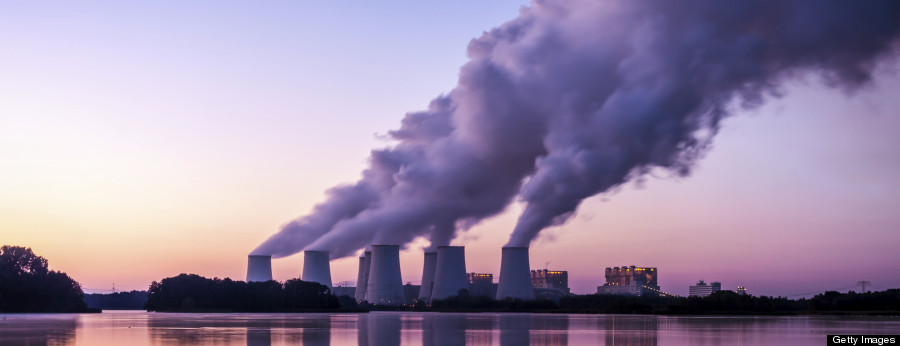Atmospheric concentrations of carbon dioxide surpassed a notable milestone this week.
They reached a daily average above 400 parts per million, reported NOAA, for the first time in human history.
The milestone, hit on May 9, may be symbolic, notes Climate Central, but manmade CO2 emissions from the burning of fossil fuels continue to rise, bringing greater atmospheric warming and exacerbating the effects of climate change.
Scientists argue we've loaded the "climate dice" in favor of more weather anomalies and extreme heat waves.
Research also shows that continued emissions of long-lived greenhouse gases like carbon dioxide will mean "largely irreversible" climate change for 1,000 years even after we curtail emissions.
"The last time we're confident that CO2 was sustained at these levels is more than 10 million years ago, during the middle of the Miocene period," climate scientist Michael Mann told The Huffington Post in an email. "This was a time when global temperatures were substantially warmer than today, and there was very little ice around anywhere on the planet."
Readings are taken at the NOAA-operated Mauna Loa Observatory in Hawaii and form part of the Keeling Curve -- a continuous record of CO2 measurements dating back to 1958. Bubbles found inside Antarctic ice core samples provide a longer record of CO2 in the air for the past 800,000 years.
CO2 measurements surpassed 400 ppm in the Arctic last summer, but the readings from Hawaii mark the first time prolonged levels above 400 ppm have been observed at more moderate latitudes.
Global carbon dioxide levels fluctuate over the course of the year, reaching an annual peak in May. LiveScience explains that the cycle reveals how trees and vegetation remove more CO2 from the air during the summer, until the annual minimum is reached in October.
"Take this day and the milestone it represents to reflect on the fragility of our civilization and and the planetary ecosystem on which it depends," Al Gore urged on Friday. "We must take immediate action to solve this crisis. Not tomorrow, not next week, not next year. Now."
350.org founder Bill McKibben said in a statement emailed to HuffPost, "The only question now is whether the relentless rise in carbon can be matched by a relentless rise in the activism necessary to stop it."
Original Article
Source: huffingtonpost.com
Author: James Gerken
They reached a daily average above 400 parts per million, reported NOAA, for the first time in human history.
The milestone, hit on May 9, may be symbolic, notes Climate Central, but manmade CO2 emissions from the burning of fossil fuels continue to rise, bringing greater atmospheric warming and exacerbating the effects of climate change.
Scientists argue we've loaded the "climate dice" in favor of more weather anomalies and extreme heat waves.
Research also shows that continued emissions of long-lived greenhouse gases like carbon dioxide will mean "largely irreversible" climate change for 1,000 years even after we curtail emissions.
"The last time we're confident that CO2 was sustained at these levels is more than 10 million years ago, during the middle of the Miocene period," climate scientist Michael Mann told The Huffington Post in an email. "This was a time when global temperatures were substantially warmer than today, and there was very little ice around anywhere on the planet."
Readings are taken at the NOAA-operated Mauna Loa Observatory in Hawaii and form part of the Keeling Curve -- a continuous record of CO2 measurements dating back to 1958. Bubbles found inside Antarctic ice core samples provide a longer record of CO2 in the air for the past 800,000 years.
CO2 measurements surpassed 400 ppm in the Arctic last summer, but the readings from Hawaii mark the first time prolonged levels above 400 ppm have been observed at more moderate latitudes.
Global carbon dioxide levels fluctuate over the course of the year, reaching an annual peak in May. LiveScience explains that the cycle reveals how trees and vegetation remove more CO2 from the air during the summer, until the annual minimum is reached in October.
"Take this day and the milestone it represents to reflect on the fragility of our civilization and and the planetary ecosystem on which it depends," Al Gore urged on Friday. "We must take immediate action to solve this crisis. Not tomorrow, not next week, not next year. Now."
350.org founder Bill McKibben said in a statement emailed to HuffPost, "The only question now is whether the relentless rise in carbon can be matched by a relentless rise in the activism necessary to stop it."
Original Article
Source: huffingtonpost.com
Author: James Gerken

No comments:
Post a Comment